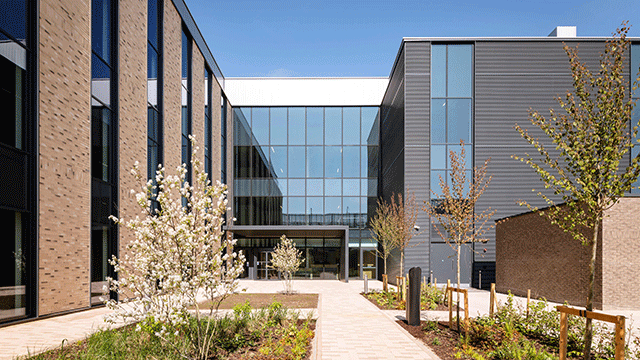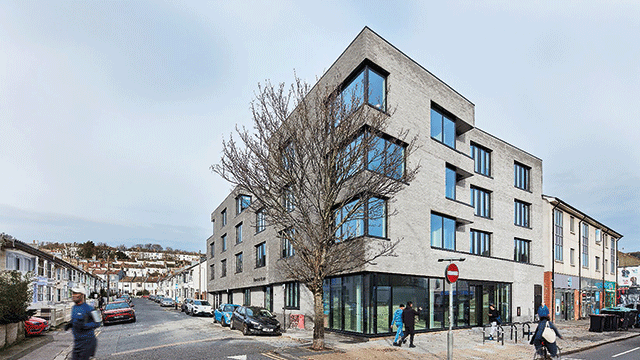French builder-developer Bouygues has at long last secured a major regeneration project in the UK, the £500m revamp of Canning Town. Paul Norman talks to its London director Nicolas Guérin
French construction behemoth Bouygues has tres grands plans for its commercial property arm in the UK.
“Our ambition is to grow in the UK – there is no question about it,” says a determined Nicolas Guérin, the 43-year-old Breton charged with making sure Bouygues is known in the UK not only as a builder, but as a developer too.
Bouygues (pronounced “Bweeg”) certainly has plenty of firepower, having raked in a global revenue of €32.7bn in 2008 from operations in 80 countries.
And now, after three years of trying to get appointed as a developer on a major UK project, Bouygues this week finalised an exclusivity agreement with Newham council to develop one of the UK’s largest regeneration schemes – a £500m makeover for the centre of Canning Town in east London.
The fact that Bouygues and social housing partner One Housing Group were selected at Canning Town ahead of a consortium including veteran developers Elliott Bernerd and Sir Stuart Lipton and UK construction firm Laing O’Rourke, makes its triumph all the sweeter. “Our chairman in Paris is very proud,” says a highly satisfied Guérin.
The company is close to announcing a masterplanner for the project and has given Estates Gazette an exclusive peek at initial plans for the scheme (see panel, p60) which Bouygues intends to use as its showpiece for becoming a major force in UK development.
Globally, Bouygues has spread its tentacles in a bewildering number of directions (see p61), and its 300-strong Bouygues UK business has been a significant player in the PFI sector for more than 14 years.
But winning a first major scheme for its fledgling Bouygues Development business here had proved frustratingly elusive.
To date, the projects developed by the UK team have been small beer. The first two out of the ground were both small, town centre schemes featuring libraries and small numbers of shops and houses in Dagenham, Essex, and Maidenhead, Berkshire.
Both developments, however, did follow the Bouygues modus operandi of keeping costs down for landowner partners by relying on its own vast resources to carry out work almost entirely in-house.
Integrated business model
“We were originally set up to procure works for the building arm,” says Guérin. “So we are not just a developer but a developer for the benefits of the builder. And we are not traders. It is not an option for us to buy land and to make a margin selling to someone else – we need to deliver a final product.”
The group stands apart, he says, by offering an integrated business model that allows it to draw on “internal-external resources” to offer the full gamut of development services – design and build, construction, and long-term management services as well as financing solutions alongside its own deep pockets The group also prides itself on securing end-user investors and tenants before it pushes the button on any development.
“We’re looking for forward sale and forward commitment to purchase from investors or other developers. We de-risk our schemes at a very early stage,” says Guérin.
Landowners, he insists, will find Bouygues’ integrated model a cost-effective one. “A distinction that is very important is we capture the developer margin and the builder margin as a single margin to reflect our integrated approach,” he says.
Perhaps most significantly, the balance sheet of the Bouygues parent offers financial certainty for prospective partners. “We use the strengths of our mother company to partly fund schemes. But it depends on the size of the project. If it is too big we’ll have to go to the market to raise funding as anybody else would,” Guérin adds.
Matthew Black, a senior director at CB Richard Ellis who has been advising Bouygues, says the group is “refreshing and exciting” to work with because it is able to “react quickly to opportunities and draw from its in-house resources and experience.”
Nevertheless, the group has struggled to get its hands on larger projects.
It fell at the final hurdle in bids to develop two major schemes for the London 2012 Olympics: Stratford’s 2,800-home Olympic Village, where it worked up proposals with Barratt Homes; and Hackney Wick’s 1m sq ft Olympics media centre, where it was bidding alongside Development Securities.
Changing economic climate
In the event, the selected private sector partners were Lend Lease and Carillion/Igloo respectively, but their subsequent failure to take equity stakes in the two projects has led many to question the government’s wisdom in ignoring Bouygues.
Guérin says Bouygues may have been fortunate, with the benefit of hindsight, to have missed out. He says the changing economic climate means the property world is now embracing his company’s “more reasonable” attitude to what is viable.
“We will grow now. It will be big regeneration schemes but we will balance these with smaller schemes that are easier and quicker to develop,” he says. “We will focus on the Greater London area up to Birmingham and the South of England, and it will be all sectors – offices, residential, retail and so on.”
Guérin is eyeing joint venture opportunities where developers have schemes they are unable to push ahead with, and this week Bouygues tabled a bid to be one of the Homes and Communities Agency’s UK delivery partners for public land.
He says the group has had early-stage talks about building a 100,000 sq ft headquarters for itself at Lend Lease’s and Quintain’s Greenwich Peninsula in south-east London but says that the project is not currently live.
But Bouygues has just opened an office in Barking as part of plans to focus on opportunities in east London.
Guérin believes that Bouygues has the savoir faire to establish itself in UK development. “In the end, we are happy to share on overage when there is an upside,” he says.
Canning town – east side story
Canning Town is the kind of large-scale project Bouygues has been seeking since it first decided to grow a development business in the UK three years ago. The scheme will include 1,100 homes, around 400,000 sq ft of shops, including a supermarket, and a further 200,000 sq ft of leisure and offices. Guérin says the first phases will focus on a large foodstore, a car park and 200 homes in a mix of tenures.
The biggest challenge, says Guérin, will be linking the northern part of the area’s notorious flyover into a new public plaza with shops and a cinema in the town centre. He says the scheme will eschew tall buildings as it focuses on creating a daytime community, where people want to stay and bring up families.
“We’ll try to develop a scheme which is reasonable, which fits into the environment. There are already towers at the site so we can do something different and create a sense of place with smaller buildings,” he adds.
Bouygues also plans to develop housing for institutions keen to invest in a private rented sector, as it has done in France and Germany.
“The private rented sector initiative being encouraged by the HCA works really well in France. We are trying to work out some kind of similar model in the UK, by bringing our 20-year knowledge of this sector to the table,” he adds.
Bouygues in brief
Bouygues was founded by Francis Bouygues in France in 1952 as a construction group. In 1989, he stepped down to set up a film production company and three years later won a Palme D’Or and three Oscars for his first major production, The Piano.
In his stead, Bouygues’ son Martin took up the reins as chairman and continues its expansion via the acquisition of aligned firms. By 2008, Bouygues had over 145,150 staff in 80 countries with subsidiaries in construction, transport, and telecoms, including French television channel TFI.
Bouygues Immobilier, the development arm, covers the office, retail, residential and hotel sectors, and has 35 branches in France, as well as eight branches in Spain, Portugal, Germany, Belgium and Poland.
The 300-strong Bouygues UK business, a subsidiary of Bouygues Construction, has been a force in the PFI sector for more than 14 years. The group launched Bouygues Development three years ago with the intention of becoming a major UK developer.
Bouygues’ other UK businesses include facilities management arm Ecovert UK and Portsmouth-based construction and services group Warings, which it bought in 2007.










